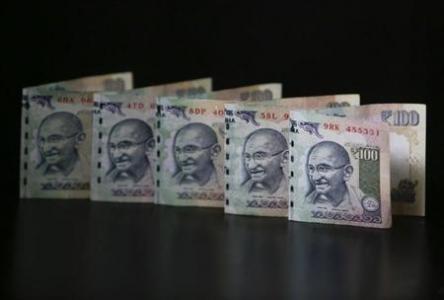(Reuters) – The Indian rupee slumped to a record low of more than 68 to the dollar on Wednesday on growing worries that foreign investors will continue to sell out of a country facing stiff economic challenges and volatile global markets.

The pummeling in markets – which sent the rupee reeling as much as 3.7 percent to an all-time low of 68.75 – forced the central bank to intervene while state-run Life Insurance Corp was spotted buying shares, allowing domestic indexes to erase steep early losses.
“If steps are not taken to implement the reforms necessary to tackle the structural issues, the government will be left with the so-called ‘3D options’: debt default, devaluation, deflation,” said Angelo Corbetta, head of Asia equity for Pioneer Investments in London.
“In India devaluation is happening now and deflation could be about to start. The good news is that the debt default is highly unlikely.”
Foreign investors sold almost $1 billion of Indian shares in the eight sessions through Tuesday – a worrisome prospect given stocks had been India’s one sturdy source of capital inflows.
If more foreign investors throw in the towel, traders fear it will put the country at risk of a vicious cycle in which the ensuing hit to confidence in turn slams shares and the currency even harder.
Policymakers have consistently struggled to come up with steps that can convince markets they can stabilize the rupee and attract funds into the country despite extraordinary measures last month by the central bank to drain liquidity and action to curb gold imports and cut India’s huge oil import bill.
The partially convertible rupee clawed back some ground later in the day and was at 67.92 as of 1015 GMT, after posting its biggest daily percentage fall in 18 years on Tuesday.
Still, an assault on the psychologically key 70 level appeared imminent.
RISING OIL PRICES, FED FEARS AMPLIFY PRESSURE
India badly needs foreign capital as it struggles with a record high current account deficit, growing fiscal pressures and an economy growing at the slowest in a decade.
The failure to address India’s economic challenges is becoming an increasing source of tension at a time when fears of a possible U.S.-led military strike against Syria are knocking down Asian markets, with the prospect that the Federal Reserve will soon end its prolonged period of cheap money further raising concerns.
At the same time, rising domestic bond yields threaten to raise borrowing costs across the already slowing economy, while global prices of oil and gold – the country’s two biggest imports – have surged this week.
“The end game for the current decline would be the day the rupee stops falling, alongside government measures like a substantial diesel price hike,” said Samir Arora, a fund manager at Helios Capital in Singapore.
BNP Paribas on Wednesday slashed its economic growth forecast for India for the fiscal year ending in March to 3.7 percent from its previous 5.2 percent – the weakest growth since 1991-92 when India buckled under a balance of payments crisis that required a loan from the International Monetary Fund.
“India’s parliament remains toxically dysfunctional with little, if any, business conducted,” BNP said.
“And, with next year’s general election looming ever nearer, the government’s willingness to instigate a politically unpopular fiscal tightening is close to nil.”
India is due to post April-June gross domestic product data on Friday, with analysts estimating the economy grew at an annual rate of 4.7 percent, roughly in line with the previous quarter. It will also post July federal fiscal deficit figures.
LACKING CONFIDENCE
The rupee has fallen around 19 percent this year, by far the biggest decliner among the Asian currencies tracked by Reuters.
Meanwhile, India’s main National Stock Exchange index fell as much as 3.2 percent, although suspected buying by LIC led the index to recover in the afternoon.
Foreign investors are paring equity positions, having sold a net $3.5 billion in stocks since the start of July, although their net purchases so far this year still total $12 billion.
Among the blue chips that fell the most on Wednesday were Axis Bank Ltd and ICICI Bank Ltd, a concern given foreign investors had so far largely held on to their investments in lenders, owning more than 40 percent of each.
In bond markets, foreign investors have sold more heavily, with outflows reaching $4.5 billion so far this year.
Yet the government has so far failed to provide a coherent response, analysts said. Its approval of infrastructure projects on Tuesday was trumped by concerns about the fiscal deficit after India’s lower house of parliament this week approved a 1.35 trillion rupees ($20.47 billion) plan to provide cheap gain to the poor.
In its latest initiative, the government late on Tuesday proposed setting up a task force to look into currency swap agreements, a measure analysts said could bring some relief if carried out in time by reducing market demand for dollars or other major currencies.
“Lets see what the authorities do, but if the government can come out with some really big currency swap arrangement with some countries, that can be a strong positive,” said Uday Bhatt, a forex dealer with UCO Bank in Mumbai. ($1 = 65.9650 Indian rupees)
(Writing by Rafael Nam; Additional reporting by Swati Bhat; Editing by Kim Coghill)





